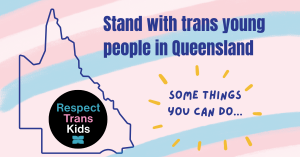BREAKING NEWS
The Federal Court of Australia has this morning handed down its landmark judgement on a case brought by a transgender woman, Roxanne Tickle, against social media platform Giggle for Girls after she was excluded from the women-only app.
In the case before the Federal Court, Roxanne Tickle alleged unlawful discrimination on the basis of gender identity.
It is the first time the gender identity discrimination provisions have been tested since they were added to the Sex Discrimination Act in 2013.
– Advertisement –

The company’s CEO Sall Grover maintained that no discrimination had occurred because Tickle was male.
Judge Robert Bromwich awarded Tickle $10,000 in compensation and costs capped at $50,000. In his ruling the judge declared that respondents considered “sex” to mean the unchangeable sex of a person at birth.
“These arguments failed because the view propounded by the respondents conflicted with a long history of cases decided by courts going back over 30 years. Those court those cases established that on its ordinary meaning, sex is changeable.” Justice Bromwich said.
Tickle had asked for $100,000 in damages for the discrimination based on gender identity and the same amount again for aggravated damages. The aggravated damages were based on an alleged online campaign led by Grover largely on social media platforms.
In a social media post Sall Grover said the judgement was what she had been expecting.
“Unfortunately, we got the judgement was anticipated. The fight for women’s rights continues.” Grover posted to X.
The ruling may be appealed, and if unsuccessful, the respondents could then apply to have the case heard by the High Court.

Professor Paula Gerber from Monash University, an expert in human rights law, said the finding was a huge victory for transgender women.
“This decision is a great win for transgender women in Australia. The Court explicitly found that the Giggle for Girls App indirectly discriminated against Roxanne Tickle on the basis of her gender identity, in breach of the Sex Discrimination Act. She was excluded after Sally Grover, the Chief Executive, looked at the photo Roxanne Tickle had uploaded with her application, and reached the visual conclusion that she was a man.” Professor Gerber said.
“She was indirectly discriminated against because Sally Grover did not think Ms Tickle looked sufficiently female. The Court found that ‘The imposed condition of needing to appear to be a cisgendered female in photos submitted to the Giggle App had the effect of disadvantaging transgender women who did not meet that condition, and in particular Ms Tickle.’
“This case sends a clear message to all Australians that it is unlawful to treat transgender women differently from cisgender women. It is not lawful to make decisions about whether a person is a woman based on how feminine they appear.
Gerber highlighted that the court had made a specific ruling about how Giggle was discriminated against.
“The Court found that there had been indirect discrimination, not direct discrimination, because there was insufficient evidence to prove that Sally Grover knew that Roxanne Tickle was transgender. Ms Grover excluded her from the App because she thought Ms Tickle was a man, not because she thought she was a transgender woman.
“The Judge held that, ‘I am left to conclude that it is most likely she did not know that Ms Tickle was a transgender woman when she reviewed her selfie, and instead excluded her on the quick or reflexive decision that she appeared to Ms Grover to be a male. Of course, given Ms Grover’s views, her decision almost certainly would have been the same had she been aware of Ms Tickle’s gender identity.’
“The Federal Court also rejected Giggle’s argument that the Sex Discrimination Act is unconstitutional because the Federal Government did not have the power to enact such laws. Justice Bromwich found that the Foreign Affairs power in the Australian Constitution authorises the government to enact laws giving effect to its international treaty obligations.
“The Sex Discrimination Act gave effect to Australia’s obligations under Article 26 of the International Covenant on Civil and Political Rights, which provides that ‘All persons are equal before the law and are entitled without any discrimination to the equal protection of the law. In this respect, the law shall prohibit any discrimination and guarantee to all persons equal and effective protection against discrimination on any ground such as race, colour, sex, language, religion, political or other opinion, national or social origin, property, birth or other status.’
“The judge held that the words ‘other status’ include discrimination on the basis of gender identity. Thus, the Sex Discrimination Act, including the 2013 amendments to it regarding gender identity discrimination were constitutional.” Gerber said.




